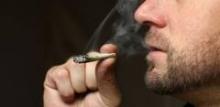Among patients with psychosis who were also heavy cannabis users, the age at onset of cannabis use significantly linked with the age when psychosis first appeared, in a study of 57 patients.
Although cannabis use alone is neither sufficient nor necessary to trigger schizophrenia, "if cannabis use precipitates the onset of psychosis, efforts should be focused on designing interventions to discourage cannabis use in vulnerable individuals," Dr. Juan A. Galvez-Buccollini and his associates wrote (Schizophrenia Res. 2012;139:157-60).
An example of a vulnerable person is someone with a first-degree relative with psychosis, "the highest risk factor for schizophrenia," said Dr. Lynn E. Delisi, senior investigator for the study, a psychiatrist at the Boston VA Medical Center in Brockton, Mass., and professor of psychiatry at Harvard Medical School, Boston. If someone had a first-degree relative, "I would caution them about the consequences of cannabis use and the association with schizophrenia," she said in an interview.
Results from prior studies had shown that cannabis use linked with an earlier age of psychosis onset in people abusing multiple substances, but studies had not looked at a possible link between the onset of cannabis use itself and incident psychosis. To address that, Dr. Galvez-Buccollini, a psychiatry researcher at VA Boston Healthcare System and Harvard, and his associates interviewed 57 patients with a current diagnosis of schizophrenia, schizoaffective disorder, schizophreniform disorder, or psychosis not otherwise specified, as well as a history of heavy cannabis use before the onset of psychosis. They defined heavy cannabis use as 50 or more ingestions during 1 year.
The participants’ average age was 25 years (range 18-39 years), 83% were men, and 88% were not married. Their average age of psychosis onset was 22 years, and their average age for first psychosis-related hospitalization was 23. The most common psychosis was schizophrenia, in 42%, followed by schizoaffective disorder, in 32%. The average age of first cannabis use was 15, preceding psychosis onset by an average of 7 years. The prevalence of daily cannabis use at the time of the study was 59%, with another 30% reporting use 2-5 days per week, and the remaining 11% reporting weekly use. The researchers identified alcohol abuse in 16%, and alcohol dependence in 8%.
The main analysis estimated the association between patient’s age at first cannabis use and the age of first alcohol use with the age when psychosis first appeared, and the age when the patients first required hospitalization for their psychosis. The analysis adjusted for several potential confounders, including age, sex, diagnosis of alcohol abuse or dependence, and family history of schizophrenia in a first-degree relative.
The researchers found a statistically significant association between the age when cannabis use began and the age when psychosis was first diagnosed after adjustment for all confounders. This link remained when the analysis excluded patients with any diagnosis of alcohol abuse or dependency during their lives. The analysis also showed a significant link between age of first cannabis use (P = .004) and age of first psychosis hospitalization (P = .008) after confounder adjustment. Age at time of first alcohol use did not link with either outcome, consistent with prior study results that failed to support an alcohol association.
Although the mechanistic link between cannabis use and the onset of psychosis is not clear, plausible explanations exist, Dr. Delisi said. Cannabis interacts with dopamine receptors and can have other neurochemical effects. "There are two components of cannabis, one that potentiates and another that antagonizes psychotic symptoms." The balance between these two effects can vary among various strains of cannabis, she said.
Dr. Galvez-Buccollini and Dr. Delisi said they had no disclosures.


